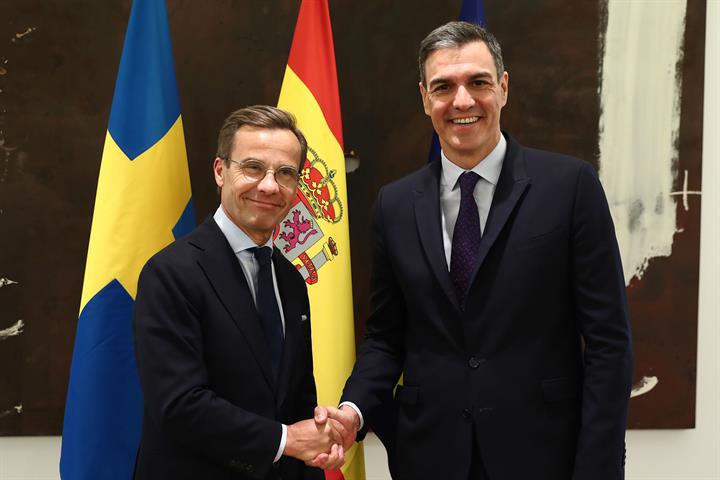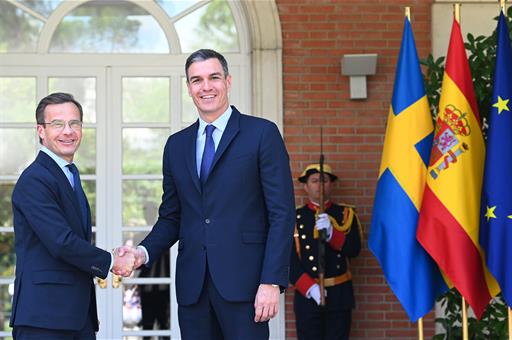Pedro Sánchez discusses with the Swedish Prime Minister the issues that will mark the agenda of the Spanish Presidency of the Council of the European Union
President's News - 2023.6.5
Moncloa Palace, Madrid
The President of the Government of Spain, Pedro Sánchez, has held a meeting at Moncloa Palace with Ulf Kristersson, Prime Minister of Sweden, the country that holds the Presidency of the Council of the EU until 30 June.
The meeting was very useful for delving into the status of the main dossiers that Spain must manage as of 1 July, when our country will take over the rotating presidency. In this context, President Sánchez took an interest in Sweden's concerns and priorities for our presidency, conveying to Ulf Kristersson the intention to structure it in a search for consensus that avoids bloc politics between the different Member States.
The two leaders agreed on the impact Putin's war has had during the Swedish presidency, emphasising that, during European Councils and EU Councils of Ministers, all countries have continued to show a common determination to continue to provide Ukraine with all the assistance it needs, be it political, economic, humanitarian or military. "As I had the opportunity to say last Thursday to President Zelenski in Moldova, Spain will continue to work, as Sweden has done, to help Ukraine on the path towards the EU," stressed President Sánchez.
He also underlined our country's support for Sweden's integration into NATO, conveying to his Swedish counterpart the wish that this accession should take place as soon as possible, since "it will contribute to making this organisation stronger, more cohesive and better prepared to face the challenges we are facing".
This unjust and unjustified war, President Sánchez stressed, has led the EU to awareness of the need to continue promoting reforms that will be at the centre of the European debate during the Spanish Presidency of the Council. In this context, the President of the Government of Spain and the Prime Minister of Sweden discussed the importance of studying the European Union's vulnerabilities, reducing our external dependence and boosting our competitiveness.
 The President of the Government of Spain, Pedro Sánchez, and the Prime Minister of Sweden, Ulf Kristersson, greet each other | Pool Moncloa/Fernando Calvo
The President of the Government of Spain, Pedro Sánchez, and the Prime Minister of Sweden, Ulf Kristersson, greet each other | Pool Moncloa/Fernando Calvo
Both agreed on the importance of continuing to focus on reindustrialisation and making progress in the green and digital transitions. These are some of the issues the two leaders discussed when addressing the current state of the law on critical raw materials, the Net-Zero Industry Act, the regulation of artificial intelligence and the package on the decarbonisation of the gas and hydrogen markets.
Regarding the importance of diversification of supply chains for Europe, President Sánchez emphasised the pending trade agreements with Latin America. "It is a region with which we share culture and values," he said, reiterating the need to make progress on agreements with Chile, Mexico and Mercosur.
The reform of the electricity market was also among the issues addressed by the two leaders. President Sánchez recalled that energy is another of the vulnerabilities the war in Ukraine has highlighted, and expressed his intention to reach an agreement before the end of this year that guarantees our consumers and companies a secure supply, at reasonable prices and in line with the objectives of climate neutrality.
The two leaders had the opportunity to address other issues that will be on the agenda of the Spanish Presidency of the EU, such as the reform of fiscal rules, the review of the multiannual budget and the conclusion of the Pact on Migration and Asylum.
President Sánchez also emphasised one of the pending objectives: to prepare the EU to face new challenges with a new geopolitical context in place and with a broader membership. "We must reflect on our future and on how we are going to make decisions when we are facing a larger, more diverse and more complex EU", he stressed, recalling that this issue will be of vital importance in contributing to the new Strategic Agenda for the next European legislative period (2024-2029).
Non official translation





